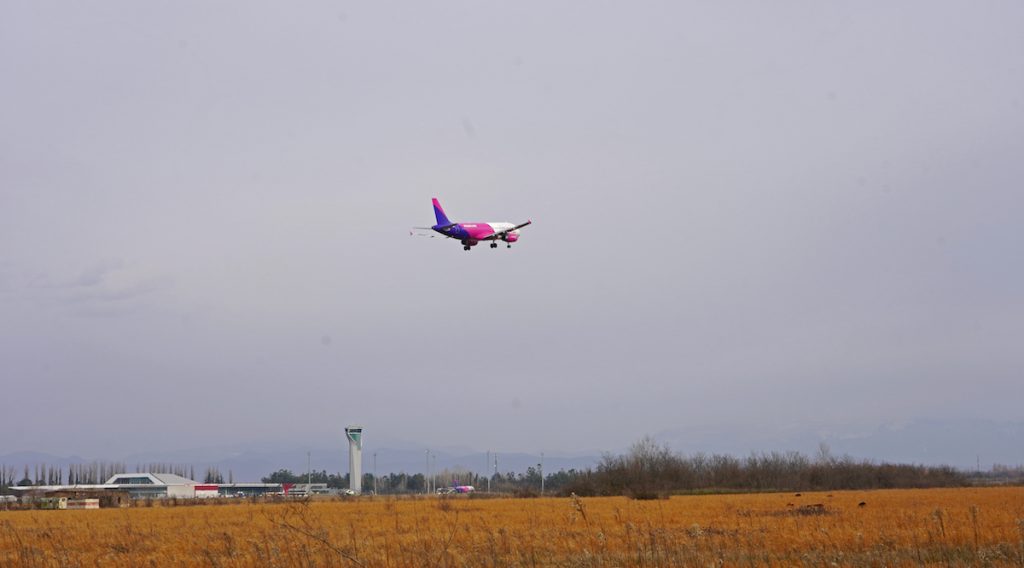Op-Ed: what’s happening to budget airlines in Georgia?
Perhaps the most hard-hitting negative news stories to come out of the coronavirus pandemic in Georgia is the decision of the Hungarian budget airline Wizz Air to close its base in the Georgian city of Kutaisi (only temporarily, for about a year, as the company stated) and, accordingly, the cancelation of most flights from this airport to European cities.
Only flights that were serviced from other airline bases will continue to operate. Starting in August, the company plans to resume only eight flights out of 29 previously operated out of Kutaisi.
This will deal a huge blow to Georgian citizens, and not just economically.
A sort of panic is spreading through social media, especially in travel groups, as over the past eight years, cheap trips to Europe have become an integral part of many people’s lives.
Students and Georgian citizens working abroad have lost the tickets already bought, some of them, for several different trips.
Those who counted on international tourism resuming shortly, with the hopes that they would be able to compensate for at least part of the huge loss suffered from the pandemic, are despondent. After all, budget flights brought in a huge portion of the tourists from Europe.
Many frustrated citizens blame the government for what happened. And these accusations are not entirely unfounded.
Unclear decision making
The government, which first announced that it would open international flights in July, that Georgia would be among the first countries in the world to start accepting tourists, and that negotiations were underway with several countries to open “green corridors,” suddenly, contrary to all previous promises, changed its mind about opening the country starting July 1, and decided to extend the flight ban for another month.

And this is with an extremely mild epidemiological situation, with only one or two new coronavirus cases reported per day.
Many European countries have already launched flights amongst other EU countries, and Georgia has become the only country in Eastern Europe to whom the EU has opened its borders.
Wizz Air held out until the last minute, waiting for Georgia to open its skies to the world, but in the end, immediately after the Georgian government’s most recent decision, it decided that it was not worth it to keep airplanes at the airport in Kutaisi for no reason.
But in July, as in previous months, the government gave only Georgian Airlines the right to charter flights. As a result, tickets for flights on this airline with mediocre service from European cities to Georgia cost up to a thousand dollars.
For many years, Georgian Airlines’ leadership has done business and dealt with competition in peculiar ways — either by demanding to drive budget airlines out of the country, or by insisting on discounted rates for using airports. And the global pandemic became a goldmine for the airline.
More than an economic issue
The consequences of this incident are not only economic, although the economy will suffer greatly. First and foremost, a successful business was closed, where up to 150 Georgian citizens worked. In addition, many more people will lose their jobs – taxi drivers, bus drivers, travel company employees, etc.
The fact is that budget airlines are much more important for Georgia than for any other country. With the opening of the Kutaisi International Airport in 2012 and the arrival of Wizz Air in Georgia, a real revolution took place in the country.
It is a well-known fact that Georgia strives to become closer to Europe, and its population supports integration into the EU and NATO. But unlike Ukraine or Moldova, Georgia does not border the EU, and you can’t just get there by car.
The opening of cheap flights to Europe made trips there accessible not only to the elite class, but to almost everyone.
Thanks to Wizz Air flights and the visa-free regime, which was initiated in 2017, hundreds of thousands of Georgian residents have traveled to Europe over the years, and many have traveled regularly to study, work, visit relatives, or simply visit popular tourist locations.
These people not only saw life in Europe with their own eyes, but also brought European work experience, education, culture and lifestyle back with them to Georgia.
The Kutaisi Airport and Wizz Air have become a vital window to Europe for Georgian citizens.
And this was of great political, and even psychological significance for the country. And the Georgian government should have done everything it could to prevent this window from closing.
But it didn’t. The only argument of those who support the government’s decision is that if tourists come from abroad, it will become more difficult to contain the coronavirus, and the healthcare system may not be able to cope.
But first off, how will one month change this situation? Or do the authorities expect to keep Georgia closed indefinitely? And secondly, the authorities had several months to prepare both the safety protocols and the health sector for resuming international travel.
But, apparently, the authorities decided to take the simplest path without really considering the consequences.
Of course, sooner or later, the market will take over, as people will need to fly to and from Georgia. But restoring what was will likely take years. And that is time we do not have.



















